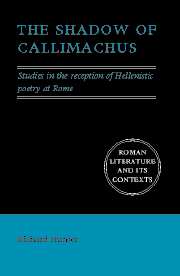4 - The shadows lengthen
Published online by Cambridge University Press: 05 June 2012
Summary
Passing on the pipe
The opening of Eclogue 1 is one of the most famous surprises in ancient literature:
Meliboeus. Tityre, tu patulae recubans sub tegmine fagi
siluestrem tenui Musam meditaris auena;
nos patriae finis et dulcia linquimus arua.
nos patriam fugimus; tu, Tityre, lentus in umbra
formosam resonare doces Amaryllida siluas.
Meliboeus. Tityrus, lying under the protection of a spreading beech you practise the woodland Muse on a slender reed; I am abandoning my ancestral territory and its sweet fields. I am leaving my ancestral home; you, Tityrus, at ease in the shade teach the woods to resound lovely Amaryllis.
Virgil, Eclogue 1.1–5Virgil and his readers will have known Idyll 1 as the first poem in whatever collection of Theocritus' poetry was familiar to them, and will have seen it as both introductory and programmatic:
Thyrsis. Sweet, goatherd, is the whispered singing of that pine tree by the springs, and sweet too is your piping.
Theocritus 1.1–3Virgil alludes to the opening of Idyll 1 in the sound of V. 1, which ‘mimics’ both the sound of the panpipes and the sound of Idyll 1.1 (Tityre tu ∼), but replaces the Theocritean exchange of compliments, in which Thyrsis and the nameless goatherd speak only of the other's accomplishments, with a speech in which Meliboeus contrasts Tityrus' happy situation with his own, followed by a response in which Tityrus is entirely concerned with his own situation. The very sound of Virgilian ‘bucolic’ is thus both familiar and radically different, and not just because we are now hearing Latin rather than Greek.
- Type
- Chapter
- Information
- The Shadow of CallimachusStudies in the Reception of Hellenistic Poetry at Rome, pp. 115 - 140Publisher: Cambridge University PressPrint publication year: 2006
- 1
- Cited by

